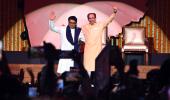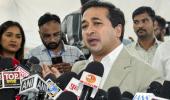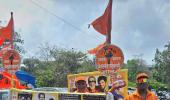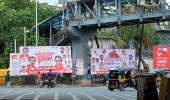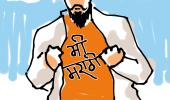'If Uddhav bhau and Raj bhau come together, who can stop us?'
Prasanna D Zore reports on the fervour and hope set off by the Thackeray cousins coming together.

We didn't know if we'd see this day. But look around -- it feels like anything is possible. We came from different towns, but today we all speak Marathi together."
This emotion by one of the attendees aptly sums up the significance of the coming together of Raj and Uddhav Thackeray after a hiatus of almost two decades.
Marathi pride takes centrestage
The NSCI Dome in Worli, central Mumbai, was a sea of saffron, "drowned in cries of Marathi pride", as Uddhav and Raj Thackeray -- the two estranged cousins -- finally shared a stage after two decades. The moment Maharashtra's Marathi manoos had been waiting for had arrived on a humid Saturday morning.
Uddhav looked directly at the sea of orange flags and declared that he and Raj "have come together on the issue of Marathi, Mumbai and Maharashtra and we will continue to be together in the future also." Seated behind, Raj nodded, a rare smile crossing his usually stern face.
The rally -- billed as Marathi Vijay Diwas (Marathi Victory Day) celebration of scrapping of the Hindi third-language order -- drew thousands of Shiv Sena-UBT and MNS supporters who were chanting slogans like "Jai Bhavani, Jai Shivaji" and "Aawaz Konacha, Marathi Manasacha".
Twenty years. That's how long it had been since the tiger's cubs had shared a stage, since they had spoken the same language of Marathi pride without the bitter undertones of political rivalry after Raj parted ways to float the Maharashtra Navnirman Sena in 2006.
Groups from across Maharashtra -- people had travelled in their own vehicles, trains, and state transport buses from all corners -- converged on the Dome, with hoardings and posters urging unity for the "Marathi manoos". None of Raj and Uddhav's supporters overtly sported any visible party symbols, and on stage the Thackeray cousins insisted that this was about more than just politics.
"It felt like the Maharashtra of old, all Marathis together," said one SS-UBT supporter from Pune, as crowds poured in for Marathi Vijay Diwas. The atmosphere was exuberant -- thousands had marched under an orange flag inscribed 'Awaj Marathicha' (Voice of Marathis) to reach the venue.
Inside the Dome, party workers and families clasped hands, sang local folk songs, danced and cheered as the cousins embraced the cheering crowd. "Saheb, we knew this day would come," said Prakash Jadhav, a 45-year-old MNS worker who had travelled from Pune. "The Marathi manoos needed both our tigers together. How can we fight for our rights when the family is divided?"
"This is a day we thought would never come," said an MNS worker from Nashik. "Finally, the two tigers' cubs are together again."
Later, the SS-UBT chief posted a photograph on X titled 'Maharashtrache Wagh' (Tigers of Maharashtra), echoing exactly how every supporter of the two political outfits described the coming together of the Thackeray cousins.
Unity -- a movement, not politics

On stage, both Thackerays stressed that their gathering transcended party lines. Raj Thackeray, in Marathi, declared bluntly: 'konatahi jhenda nahi, Marathi hach agenda' (there will be no party flags here -- our only agenda is Marathi). Uddhav agreed, reminding the crowd that this was "not just about politics -- this is about Marathi".
Neither bore grudges on the podium: after Raj's fervent address, Uddhav patted his cousin on the back when he took the seat next to him and gestured that Raj's speech was mast (great). Their easy camaraderie -- smiles, playful jibes, handshakes -- reinforced the message.
Raj even thanked Chief Minister Devendra Fadnavis of the BJP for unexpectedly engineering this reunion, saying "What Balasaheb couldn't achieve, Devendra Fadnavis did -- brought Uddhav and I together."
The crowd roared in laughter and applause at this characteristic Raj Thackeray jibe, acknowledging the irony.
Uddhav too was at his satirical best, at times using double entendre, a hallmark associated with the speeches of his late father Bal Thackeray and cousin Raj. And he underlined what mattered most: "More important than our speeches is that Raj and I are seen together," he said.
He too thanked the Maharashtra chief minister for uniting the two brothers -- by first issuing a government resolution making Hindi mandatory as a third language for students of Class I to Class V and then withdrawing the controversial GR after social and political pressure began building up against the government.
Then, to thunderous applause, Uddhav spilled the beans: "We have come together to stay together," one of the most potent statements of his speech, indicating that the two cousins are looking forward to a long haul: That this Marathi Vijay Diwas celebration and unity will not be merely a blip but herald a political alliance in the days ahead.
Cousins? Rivals? None of that was on display this Saturday, July 5. Both parties' workers even blended in the crowd, sharing chai and selfies. "For 20 years we fought each other," admitted a senior Shiv Sena supporter from Kolhapur. "Today we forget that. The Marathi manoos come first now."
A fierce defence of Marathi language
Both leaders spared no words in opposing the Hindi language order that had sparked the rally. Uddhav warned the crowd sternly, "We will never allow Hindi to be forced upon Marathi people", and vowed that the government's "gundagiri over language will not be tolerated".
Raj Thackeray, giving voice to Marathi pride, asked of the government: "Where did this Hindi language issue suddenly come from? It's completely unnecessary. Children in classes 1 to 5 don't need to study Hindi."
He reminded them that Hindi is barely 200 years old -- it did not even exist in "Maharaj's time" (when Chhatrapati Shivaji ruled the Deccan) -- and that the Maratha Empire once ruled great lands without forcing Marathi on others. Raj drew roaring applause when he framed the language row as a slippery slope: "They started by imposing Hindi on us, testing if we would object. If we hadn't raised our voice, they would have gone on to separate Mumbai from Maharashtra."
Videos: Prasanna D Zore/Rediff
The crowd erupted. This wasn't just about language policy anymore -- it was about the very future of Maharashtra's and Mumbai's political landscape. Uddhav added that the backlash from hundreds of thousands of Marathi people had compelled the government to back down. "Hindi cannot be forced on Maharashtra," he declared. Addressing dissenters, Raj quipped that even Balasaheb Thackeray studied in English-medium schools yet never forgot his love for Marathi language.
"Maharashtra belongs to us Marathi people," Uddhav later insisted, invoking Shivaji. "It is the land of each and every proud Marathi. We must stay united, and never allow our language or our pride to fade away."
Empowering the Marathi manoos
Amid chants and banners, supporters spoke of language, but also of livelihoods.
"This unity will empower us," said Ganesh Pawar, a software engineer from Pune wearing an MNS cap. "Our Marathi manoos have struggled for jobs and business for so long. Now I feel our voice matters."
An auto rickshaw driver from Thane added: "Tomorrow, maybe a Marathi youth like my son will get that government job or loan for his startup he is dreaming of."
At one corner of the Dome, two textile merchants from Nagpur were all excited at the prospect of the two Thackerays coming together. "We've been waiting for local businessmen to get some respect," said Lalit Deshmukh. "Maybe now we can finally get the support we need to compete with outsiders on equal terms."
The undercurrent in nearly every conversation was the hope that this rally was more than symbolic. "They promised we'll stay together -- and we believe them," smiled Sanjay Kulkarni, an Uber driver, who had travelled all the way from Ahmednagar, 266 km away from Mumbai. "We've always been told Hindi, Hindi -- now it's Marathi, Marathi. Maybe we'll get help opening our own shop or software start-up, maybe loans for small factories in Nagpur or Pune. Marathi pride means our work and culture will be protected," he hoped.
Even a young Uddhav Sena activist conceded: "We didn't know if we'd see this day. But look around -- it feels like anything is possible. We came from different towns, but today we all speak Marathi together."
Onwards to elections and beyond

As the rally wound down, many party workers were already talking polls. MNS and Sena volunteers hugged and shook hands, confident that a formal tie-up could follow. "It's only a matter of time before we fight elections as one," said Rahul Kot, an MNS vibhag adhyaksh from Kalyan.
"In the next BMC polls and others, we'll win all the corporations handsomely if we come together," said Rahul's paternal cousin Vijay Kot, who is SS-UBT's Kalyan upa-vibhag pramukh.
Interestingly, Rahul's and Vijay's fathers -- like Raj's and Uddhav's fathers Shrikant and Bal -- are real brothers and these two cousins, though siding with the two Thackeray brothers and their respective political parties, had managed to maintain cordial relations since the MNS's formation in 2006.
Echoing this sentiment, a Shiv Sainik from Navi Mumbai vowed, "If Uddhav bhau and Raj bhau come together, who can stop us?" His emphasis was on momentum: several small municipal elections loom in Maharashtra, and supporters believe a united Marathi front of MNS-SS (UBT) will help them sweep these elections.
Even Congress allies noted the shift: the Maharashtra Congress sat out the rally, but field workers were grinning. One Congress functionary noted wryly that "the Marathi manoos has spoken louder than any party. It's a new era."
Whether this newfound fraternity lasts beyond the streets and into the voting booths remains to be seen, but for now Marathi supporters of both Shiv Sena-UBT and MNS celebrated like old friends reunited. They knew their leaders had sent a clear message: this unity is "not just a one-off celebration -- we have come together to stay together," and together they plan to fight for Marathi interests at the ballot box and beyond.
